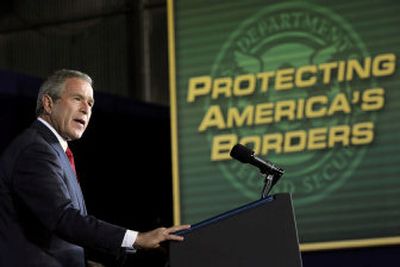Bush looks to borders to advance his agenda

WASHINGTON – Taking a tough gamble at the end of a rough year, President Bush is pushing immigration reform as a way to restart his stalled agenda and regain the broader momentum he has lost amid falling approval numbers, a White House scandal and an unpopular war.
Most recently, Bush made immigration the topic of his weekly radio address on Saturday.
Reforming the nation’s immigration laws – a goal that has eluded presidents for decades – would be a major accomplishment. Bush could reclaim the allegiance of his party’s conservatives while resurrecting the “compassionate conservative” image that has proved so appealing to centrists.
But the weakened president’s renewed focus on securing the nation’s borders, while also accommodating millions of undocumented immigrants, could backfire dramatically. Immigration, after all, is one of the most volatile issues in America and is one that sharply divides Bush’s party.
Bush hopes to appease the business leaders who want to continue employing undocumented workers as well as the cultural conservatives who oppose any sort of amnesty. In trying to split the difference, Bush risks igniting a firefight within his party, angering his conservative base and alienating the Hispanic voters whom he has long courted.
And with Bush’s popularity at an all-time low, few Republicans have qualms about rebuffing him, particularly his plan to create a temporary worker program for undocumented migrants.
“The administration is on the wrong side of public opinion and the American people when it comes to amnesty, when it comes to increasing immigration and when it comes to bringing in cheap foreign labor to compete with American workers,” said Rep. Lamar Smith, R-Texas. “We need to stand up for the American worker.”
Bush has recalibrated his sales pitch to emphasize national security and protecting the borders.
“Those who enter the country illegally break the law,” Bush reiterated on Saturday.
But a centerpiece of his approach remains allowing workers to remain in the country for three to six years, so long as employers need them – a plan that amnesty critics and immigrant advocates alike call unworkable.
“The idea that 11 million here illegally are going to sign up for a program that is going to (eventually) result in their removal is unworkable. Most won’t sign up,” said Frank Sharry, executive director of the National Immigration Forum, an immigrants’ advocacy group. “The good news is that (Bush) continues to address the issue, and he hasn’t backed down from the point of view that temporary workers need to be part of it. But politically, they’ve made a mishmash of this issue.”
The president has proposed matching “willing foreign workers with willing American employers,” offering millions already in the United States and others in foreign countries legal status to work here for three years. They could renew that three-year term and seek U.S. citizenship. But most would be required to return home after six years.
Although he has failed to win support for his plan in the Republican-run Congress – and has done little to pursue it – Bush increased his share of the Hispanic vote in his 2004 re-election.
But since then, Bush has encountered the roughest year of his presidency with an increasingly unpopular war in Iraq pulling his job-approval ratings down to 37 percent in the latest Gallup Poll. The president is seeking to regain his political standing in part by courting his most conservative base, beginning with the nomination of Judge Samuel Alito to the Supreme Court after Harriet Miers’ withdrawal.
And now Bush has returned to immigration reform, with a promise to tighten the borders rather than focusing on the immigrant-friendly ideas he emphasized earlier.
“It is the most politically volatile issue out there,” said David Keene, chairman of the American Conservative Union. “What Bush has done is not really change the program. He’s always had border control in it. But now he has put border security first, rather than as an afterthought. And I think that makes it more salable.”